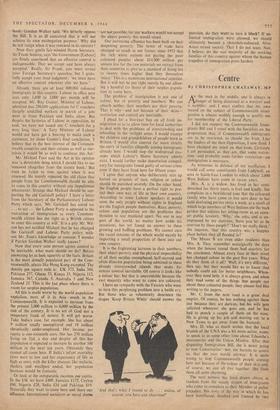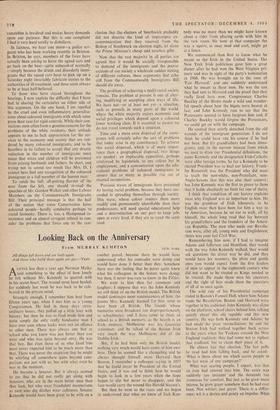Centre
By CHRISTOPHER CHATAWAY, MP
As the man in the middle, one is always in fAdanger of being dismissed as a waverer and a wobbler, and I must confess that my own record on the subject of Commonwealth immi- gration is almost wobbly enough to qualify me for membership of the Liberal Party.
I did not support the Commonwealth Immi- grants Bill and I voted with the Socialists on the proposition that, if Commonwealth immigrants are to be restricted, so should the Irish. Like the leaders of the then Opposition, I now think I have changed my mind on that issue, Certainly I am persuaded, as they are, that some restric- tion—and probably some further restriction—on immigration is necessary.
As witnesses in defence of my vacillation, I would call some constituents from Ladywell, an area in South-East London to which about 2,000 West Indians have come in recent years.
Mrs. A. is a widow, has lived in her semi- detached for thirty years, is frail and kindly. She complains in a bewildered tone that the coloured family who have come to live next door to her hold deafening parties twice a week, as a result of which large numbers of West Indians use the back garden that adjoins her sitting-room as an open- air public lavatory. 'Why,' she asks, and is un- impressed by my statistics, `have you let us be overrun by these people?' Don't we really think,' she inquires, `that this country was a happier place before they all flooded in?'
The Misses B are even older residents than Mrs. A. They remember nostalgically the days when the houses round them had quarters for the coachmen. Almost every face in their street has changed colour in the past five years. What do they think of it all? `Well, it's very different,' they say, but they would like us to know that nobody could ask for better neighbours. When- ever they need help, it is always given, and when they read some of the things that people say about these coloured people, they almost feel like writing to the papers.
Mr. C from the next road is a great deal angrier. Of course, he has nothing against them
just because they are darkies, but his wife gets solicited whenever she goes out, and he has had to punch a couple of them on the nose. He is giving up his job and moving out to a New Town to get away from the bastards.
Mrs. D, who so much wishes that the local branch of the UNA was a bit more active, wants to speak to us some other time about Tshombe's mercenaries and the Union Miniere. After that disgusting Immigration Bill, she is never going to vote Conservative not, she hastens,to assure us, that she ever would anyway. It is quite wrong to stop Commonwealth people coming here just because of the colour of their skin and, of course, we can all live together. She finds them all quite charming.
The next witness has been drawn almost at random from the steady stream of immigrants who come to complain to their Member of police prejudice. His story of the way in which he has been humiliated, insulted and framed by two
constables is involved and makes heavy demands upon our patience. But this is one complaint I find it very hard totally to disbelieve.
In fairness, we hear one more—a police ser- geant who has been working recently in Brixton.
` In Brixton, he says, members of the force have actually been asking to leave the squad cars and go back on the beat—quite unheard-of normally --simply because the drunk and disorderly immi- grants that the squad cars have to pick up on a Saturday night invariably fabricate stories to the authorities of ill-treatment, and these seem always to be at least half-believed.
To those who have stayed throughout the hearings, I now explain the difficulty that I have had in sharing the certainties on either side of this argument. On the one hand, I am repelled by the cruel and even inflammatory generalisa- tions about coloured immigrants with which some press their case for rigid controls. While their con- victions stem often from a genuine concern for the problems of the white residents, their attitude appears to me to lack appreciation for the ser- vices to the economy and society that are ren- dered by many coloured immigrants, and to be heartless in its failure to accept that any drastic reduction in the number of immigrants must mean that wives and children will be prevented from-joining husbands and fathers. In short, and trying not to sound too much like Mrs. D, I cannot here find any recognition of the coloured immigrant as a full member of the human race.
To catch the full, off-putting flavour of the case from the left, one should re-read• the speeches of Mr. Gordon Walker and other Labour Members on the Commonwealth Immigrants Bill. Their principal message is that the half of the nation that votes Conservative hates coloured people—hardly conducive perhaps to racial harmony. There is, too, a Hampstead re- moteness and an almost' arrogant refusal to con- sider the problems that force one' to the con- elusion that the-electors of Smethwick probably did not deserve the kind of impromptu ex- communication that they received from the Bishop of Southwark on election night, let alone the Prime Minister's cheap and tasteless gibe.
Now that the vast majority in all parties are agreed that it would be socially irresponsible to demand of the immigrants and the poorer sections of our society a wholesale sudden mixing of different cultures, these arguments teat echo still from the Commonwealth Immigrants Bill should die away.
The problem of achieving a multi-racial society remains. The problem at-present is one of alter- ing, modifying or accepting alien ways of life. We have not—or at least not yet- -a situation, such as prevails in, many parts of the world. where the white majority enjoys economic and- social privileges which depend upon a coloured lower working class. It is essential to ensure we do not travel towards such a situation.
Time and a more even dispersal of the immi- grants will certainly solve the sort of problems that today arise in my constituency. To achieve this social dispersal, which is of more impor- tance than a geographical dispersal, two things are needed: an implacable opposition, perhaps reinforced by legislatidn, to any colour bar in employment, and a concentration upon the edu- cational problems of coloured immigrants to ensure that as many as possible rise out of manual occupations.
Previous waves of immigrants have presented no lasting racial problem, because they have suc- ceeded in spreading themselves through society. This wave, whose colour renders them more readily and permanently identifiable than their predecessors, will need special educational help and a determination on our part to keep jobs open at every level, if they are to tread the same road.



































 Previous page
Previous page